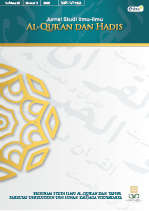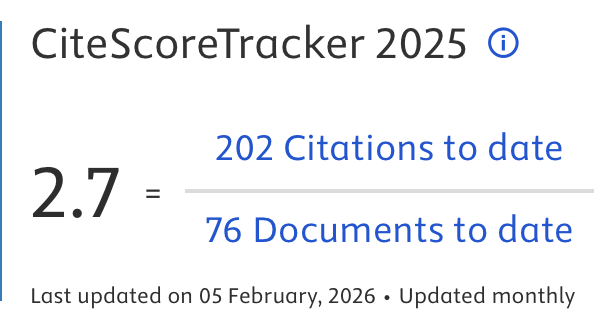Unveiling the Implicit Message: A Comprehensive Exploration of Qur'anic Democracy using Ma’na-cum-Maghza Approach
DOI:
https://doi.org/10.14421/qh.v23i2.4616Keywords:
al-Qur’an, Democracy, Ma’na-cum-Maghza, Ali Imran: 159, hermeneuticAbstract
Democracy has become a subject of debate among Muslim intellectuals due to its non-primary source origin from Islam. The journey of democracy in the Islamic world is accompanied by both support and opposition. Nevertheless, this does not imply that the Qur'an is incapable of addressing these issues. Despite not being explicitly mentioned, the concept of democracy can be discerned through implicit messaging and the process of interpretation. One of the verses that encompasses this concept is QS. Ali Imran: 159. This article aims to unveil the implicit message by employing a contemporary verse interpretation approach known as mana-cum-maghza. This approach results in the identification of five elements that constitute Qur'anic democracy. Firstly, upholding divine values. Secondly, exhibiting a humanitarian and unifying attitude. Thirdly, implementing decisions that arise from conferences, which can take the form of regulations and power transfer (democratic in nature). Fourthly, adhering to legal sources that are applicable to all citizens. Lastly, entrusting specialized individuals with the responsibility of managing specific fields.
References
Abdul Aziz. Chiefdom Madinah: Kerucut Kekuasaan Pada Zaman Awal Islam. Tangerang: PT Pustaka Alvabet, 2016.
Al-Asfahani, Ar-Raghib. Al-Mufradat Fi Gharib Al-Qur’an. Mesir: Darul Mustofa, 1961.
Al-Baqi’, Muhammad Fuad ’Abd. Mu’jam Al-Mufahras Li Al-Fadzi Al-Qur’an Al-Karim. Mesir: Darul Kutub, 1364.
Al-Buthi, Muhammad Sa’id Ramadhan. Sirah Nabawiyah: Analisis Ilmiah Manhajiah Sejarah Pergerakan Islam Di Masa Rasulullah SAW. Translated by Aunur Rafiq Shaleh Tamhid. Jakarta: Robbani Press, 1999.
Al-Qur’an, Lajnah Pentashihan Mushaf. Al-Qur’an Dan Terjemahan. Jakarta: Badan Litbang dan Diklat Kementrian Agama RI, 2019.
Al-Qurthubi, Ahmad bin Abi Bakr. Al-Jami ‘Li Ahkam Al-Qur’An. Jakarta: Pustaka Azzam, 2008.
Amrullah, Haji Abdul Malik Karim. Tafsir Al-Azhar. Singapura: Pustaka Nasional PTE LTD, 1982.
At-Thabari, Abu Ja’far Muhammad bin Jarir. Tafsir Ath-Thabari. Translated by Akhmad Affandi. Jakarta: Pustaka Azzam, 2008.
Az-Zuhaili, Wahbah. Tafsir Al-Munir. Translated by dkk. Abdul Hayyie al-Kattani. Jakarta: Gema Insani, 2013.
Budiarjo, Miriam. Dasar-Dasar Ilmu Politik. Jakarta: CV. Prima Gravika, 2008.
Dahl, Robert A. On Demomracy. New haven & London: Yale University Press, 1998.
Hakiki, Kiki Muhamad. “Islam Dan Demokrasi: Pandangan Intelektual Muslim Dan Penerapannya Di Indonesia.” Wawasan: Jurnal Ilmiah Agama dan Sosial Budaya Vol. 1, no. No. 1 (2016): 1–17.
Hitti, Philip K. History of Arabs: Rujukan Induk Dan Paling Otoritatif Sejarah Peradaban Arab. Translated by Cecep Lukman Hakim dan Dedi Slamet Riyadi. Jakarta: Serambi, 2006.
Hook, Sidney. “Democracy.” Encyclopedia Americana. Danburry: Grolier Incorporated, 1983.
Ishaq, Ibnu. Sirah Nabawiyah: Sejarah Lengkap Kehidupan Rasulullah SAW. Translated by Samson Rahman. Jakarta Timur: Akbar Media, 2013.
Katsir, Ibnu. Sirah Nabi Muhammad Shallallahu ’alaihi Wa Sallam. Translated by Abu Ihsan Al-Atsari. Jakarta: Pustaka Imam asy-Syafi’i, 2010.
———. Tafsir Ibnu Katsir. Translated by M. Abdul Ghoffur E.M. Bogor: Pustaka Imam asy-Syafi’i, 2003.
Lane, Edward William. Arabic-English Lexicon. Jilid 3. New York: Frederick Ungar Publition, 1867.
———. Arabic-English Lexicon. Jilid 4. New York: Frederick Ungar Publition, 1867.
———. Arabic-English Lexicon. Jilid 5. New York: Frederick Ungar Publition, 1874.
Manzur, Ibnu. Lisanul Arab. Kairo: Darul Ma’arif, 1119.
Maududi, Abul A’la. The Islamic Law and Constitution. Lahore: Islamic Publications Ltd., 1960.
Mayo, Henry B. An Introduction to Democratic Theory. New York: Oxford University Press, 1960.
Munawwir, Ahmad Warson. Kamus Al-Munawwir. Surabaya: Pustaka Progressif, 1997.
Quthb, Sayyid. Tafsir Fi Zhilalil Qur’an. Translated by Dkk. As’ad Yasin. Jakarta: Gema Insani, 2001.
Rahman, Fazlur. Islam & Modernity: Transformation of an Intellectual Tradition. Chicago: The University of Chicago Press, 1982.
Saeed, Abdullah. Al-Qur’an Abad 21: Tafsir Kontekstual. Translated by Ervan Nurtawab. Bandung: PT. Mizan Pustaka, 2015.
Scholler, Marco. “Medina.” Edited by Jane Dammen McAuliffe. Encyclopedia of the Qur’an. Leiden: Brill, 2001.
Shihab, M. Quraish. Tafsir Al-Misbah: Pesan, Kesan, Dan Keserasian Al-Qur’an. II. Tangerang: Penerbit Lentera Hati, 2005.
———. Wawasan Al-Qur’an: Tafsir Maudhu’I Atas Pelbagai Persoalan Umat. Bandung: Mizan Pustaka, 2007.
Sunarso. Membedah Demokrasi: Sejarah, Konsep, Dan Implementasinya Di Indonesia. Yogyakarta: UNY Press, 2015.
Syamsuddin, Sahiron. Hermenetika Dan Pengembangan Ulumul Qur’an. Yogyakarta: Pesantren Nawasea Press, 2017.
———. “Metode Penafsiran Dengan Pendekatan Ma’na-Cum-Maghza.” In Pendekatan Ma’na-Cum-Maghza Atas Al-Qur’an Dan Hadis: Menjawab Problematika Sosial Keagamaan Di Era Kontemporer, edited by Sahiron Syamsuddin. Bantul: Lembaga Ladang Kata, 2020.
Downloads
Published
Issue
Section
License
Copyright (c) 2023 Muhammad Dzilfikri Al Baihaqi

This work is licensed under a Creative Commons Attribution-NonCommercial-NoDerivatives 4.0 International License.
Publishing your paper with Jurnal Studi Ilmu-ilmu al-Qur'an dan Hadis means that the author or authors retain the copyright in the paper. Jurnal Studi Ilmu-ilmu al-Qur'an dan Hadis uses license CC-BY-NC-ND or an equivalent license as the optimal license for the publication, distribution, use, and reuse of scholarly works. This license permits anyone to copy and redistribute the material in any medium or format and must give appropriate credit, provide a link to the license, and indicate if changes were made. If you remix, translate, transform or build upon the material you may use it for private use only and not for distribution. Jurnal Studi Ilmu-ilmu al-Qur'an dan Hadis granted an exclusive non-commercial reuse license by the author(s), but the author(s) are able to put the paper onto a website, distribute it to colleagues, give it to students, use it in your thesis, etc, so long as the use is not directed at a commercial advantage or toward private monetary gain. The author(s) can reuse the figures and tables and other information contained in their paper published by Jurnal Studi Ilmu-ilmu al-Qur'an dan Hadis in future papers or work without having to ask anyone for permission, provided that the figures, tables, or other information that is included in the new paper or work properly references the published paper as the source of the figures, tables or other information, and the new paper or work is not direct at a private monetary gain or commercial advantage.
Jurnal Studi Ilmu-ilmu al-Qur'an dan Hadis journal Open Acces articles are distrubuted under the Creative Commons Attribution-NonCommercial-NoDerivatives 4.0 International (CC BY-NC-ND 4.0). Article can be read, copy and redistribute the material ini any medium or format under the following conditions:
Attribution — You must give appropriate credit, provide a link to the license, and indicate if changes were made. You may do so in any reasonable manner, but not in any way that suggests the licensor endorses you or your use.
NonCommercial — You may not use the material for commercial purposes.
NoDerivatives — If you remix, transform, or build upon the material, you may not distribute the modified material.











